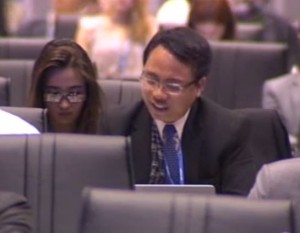The Bonn climate change conference is entering its final hours of negotiations and little has been accomplished to satisfy those nations who would be the recipients of any agreement carried forward to COP21 next December in Paris.
When developed nations fail to make commitments, developing nations push back with more and more outrageous demands claiming the guilty need to pay. Loss and Damage is one of those newer demands first introduced at COP16 in Cancun, Mexico.
The proposed new entitlement was debated for two years and then during COP19 in  Warsaw, Poland in 2013, the Philippine Islands were hit by typhoon, Haiyan. The fact this unfortunate tragedy happened during the COP gave this concept new life and the Warsaw International Mechanism WIM was created. It’s purpose is to deal with persons who have suffered “loss and damage associated with the impacts of climate change, including extreme events and slow onset events.” This wording encompasses any and all weather events not just severe unexpected weather.
Warsaw, Poland in 2013, the Philippine Islands were hit by typhoon, Haiyan. The fact this unfortunate tragedy happened during the COP gave this concept new life and the Warsaw International Mechanism WIM was created. It’s purpose is to deal with persons who have suffered “loss and damage associated with the impacts of climate change, including extreme events and slow onset events.” This wording encompasses any and all weather events not just severe unexpected weather.
Mitigation and adaptation already exist to compensate developing nations through technology transfer and the financing of projects for infrastructure at a yearly cost of $8 billion. The primary beneficiaries of these programs have been China, India and Brazil while smaller countries especially small islands states SIS have been passed over. SIS now see this as a golden opportunity to cash in, especially since loss and damage is intended to compensate persons not countries.
 Two months ago the small island of Vanuatu was hit by tropical cyclone, Pam. Immediately President, Baldwin Lonsdale threatened a lawsuit against those he deemed guilty, the fossil fuel companies, in order to make a real case for the necessity of loss and damage.
Two months ago the small island of Vanuatu was hit by tropical cyclone, Pam. Immediately President, Baldwin Lonsdale threatened a lawsuit against those he deemed guilty, the fossil fuel companies, in order to make a real case for the necessity of loss and damage.
It is claimed the fundamental legal principle of international law, confirmed by the International Court of Justice, provides states should not cause harm outside their jurisdiction and should respect the environment of other states and areas beyond their frontiers. Since current emissions are above the UNFCCC determined safe levels and because of claimed historical cumulative emissions racked up over 50 years, developed countries will be forever blamed for causing climate consequences to developing nations.
Proponents of loss and damage believe this is an insurance policy with no expiration date. They also believe this is much more than just insurance so it has been proposed the WIM be a stand-alone entity, dealing with “non-economic loss and damage“ such as climate change-induced migrants and displaced persons. The WIM would become a global welfare agency doling out housing and food.
Loss and damage is just one proposal of many in the document headed to Paris which brings the developed and developing nations to logger heads.
The developing nations have developed an insatiable appetite for handouts. To those whom much is given much is taken.
I (we) do not owe ANYONE, or country, anything. This is no different than obunghole, notso-sharpton and their lot claiming whites OWE minorities this or that, and fossil fuel companies are not responsible for a cyclone in Vanuatu (East Bum F…). All just wealth re-distribution tactics from the deranged minds of liberals. The aholes using the natural occurrences of the earth as their reason for their claims “man made climate change” has caused some loss to them are nothing more than criminal shysters, (hey obunghole and sharpton again). It is extremely unfortunate that the dumbed-down have put this buffoon (obunghole) in a position to cost the American tax payers billions of dollars.
Since there is absolutely no proof or connection between GW & natural disasters, how in the world can anyone or any country claim they are “entitled” to compensation? It is my guess that they will work earthquakes, tsunami’s, and Volcanoes into the equations. As we know, the UN has set up this expectation, but does this mean that the largest CO2 producer in the world (China) must pay themselves as well as 25% of the world for their “transgressions”? What is the formula for Europe, China, Russia, and the U.S. and when will India and Brazil become recognized as major contributors? Maybe Saudi Arabia and Venezuela should be included since they are pumping the oil.
This will leave the United States subject to the greatest blackmail scams in history. Look at the greatest natural disasters in history. All before carbon dioxide was increasing.
Ten deadliest natural disasters
RankDeath toll (estimate)EventLocationDate170061000000000000001,000,000–4,000,000*[1]1931 China floodsChina01931 !July, August, 193127005900000000000000900,000–2,000,000[2]1887 Yellow River floodChina01887 !September, October, 188737005830000000000000830,000[3]1556 Shaanxi earthquakeChina01556 !January 23, 155647005242000000000000242,000–779,0001976 Tangshan earthquakeChina01976-07-01July 19765500,000–1,000,000[1]1970 Bhola cycloneEast Pakistan (now Bangladesh)01970-11-13November 13, 197067005300000000000000300,000[4]1839 India CycloneIndia01839 !November 25, 18396300,000[5]1737 Calcutta cycloneIndia01737-10-07October 7, 17378273,400[6]1920 Haiyuan earthquakeChina01920-12-16December 16, 192097005250000000000000250,000–300,000[7]526 Antioch earthquakeByzantine Empire (now Turkey)00526-05-01May 526107005260000000000000260,000[8]115 Antioch earthquakeRoman Empire (now Turkey)00115-12-13December 13, 115
————————————————————————————————–
We will have to pay for events like these in the future if the U. S. becomes party to this agreement.
James H. Rust, Professor of nuclear engineering
—————————————————————————————————————-
I guess liberals don’t watch the History Channel. The segment about climate change is especially interesting because of everything that happened before man was even around. This should be shown in schools instead of Al Gores commercial.